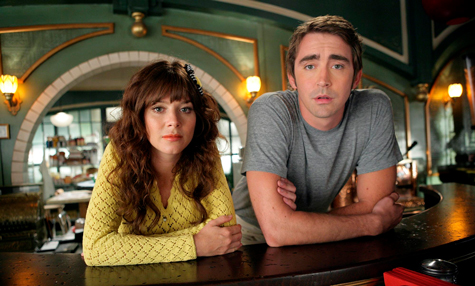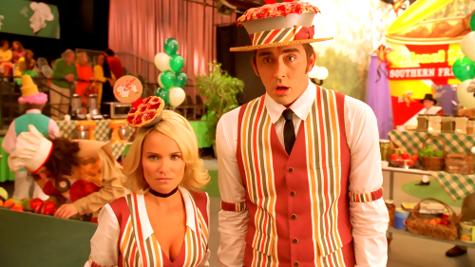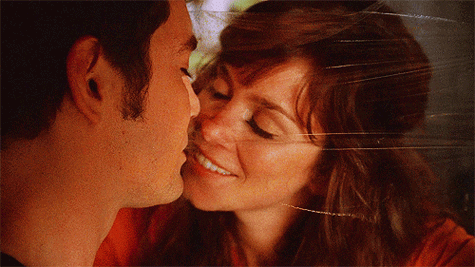
In the lovely little town of Coeur de Coeur…
The word “necromancer” brings to mind a very specific image: black robes, black nails, black teeth, maybe some ravens and unlucky black cats, dribbly candles (black, of course), and ebon shadows (continuing in the black-ish theme).
Heavy on the grim, dark, and evil, basically.
There was a very unusual restaurant run by a very unusual baker…
So when Ned the Piemaker appears onscreen in “Pie-lette”—the only thing black about him being his fitted t-shirt—that preconception is pretty much dashed to bits.
Because gangly, awkward, handsome Ned (played by the ever-charming and tree-tall Lee Pace, before his was a more recognizable face), with his floofy hair and puppy eyes, his earnest sincerity and his aw-shucks smile, is a necromancer. Albeit, one who'd much rather just bake pies and who raises the dead through a natural fluke rather than in dark magic ceremonies, but a necromancer nonetheless.
And, therein lies the undeniable, paradoxical charm of Pushing Daisies: it's a show wholly focused on death, revived corpses, crime, lies, and loss—and yet, it's as sweet, warm, and comforting as Mom's apple pie.
The world of Daisies is Technicolor in saturated hues and nostalgic with its retro fashions and lavish set designs. If not for the modern technology and references, we might think it a runaway from an MGM musical lot. It's clearly not our mundane, drab world.

It's Oz by way of The Brady Bunch, with a healthy dash of Hitchcock, Amélie, and The Addams Family. Creator Bryan Fuller, in fact, strikes me as this generation's Charles Addams (the man behind the beloved kooky, ooky, and altogether spooky Addams Family). He knows how to balance the macabre with the charmingly whimsical, giving us just enough of each that it's not entirely horrific but not entirely saccharine, either.
In short, he's the sort of man who can put the “fun” back in funeral; he's also the man behind fan-favorite Dead Like Me and the darker but equally artistic Hannibal. (Plus, he's writing the upcoming American Gods adaptation, which I have extremely high hopes for.)
Pushing Daisies may be a spiritual cousin to The Addams Family and The Munsters, but it was also a refreshingly new kind of show. A throwback with modern sensibilities, there was often a sharp bite beneath the stylized fun.
The dialogue is awash with puns, quips, rhymes, and references; it's all-around lightning-fast, very Gilbert and Sullivan in its rhythms. The characters have the oddest, most endearing names: Charlotte “Chuck” Charles, Olive Snook, Emerson Cod, Alfredo Aldarisio, Oscar Vibenius, Lemuel “Lefty Lem” Weinger.
They all have unexpected jobs and hobbies, too. Emerson Cod (Chi McBride at his funniest) is a surly private eye who discovers Ned's secret and uses it to his own financial gain; the two team up and ask murder victims who killed them, then collect the rewards. But, Emerson's also an obsessive knitter when he's stressed, which means he has an extensive collection of sweaters, gloves, and gun cozies. Talk about going against type.
The diminutive Olive Snook (Kristin Chenoweth, then fresh off her Broadway success as Glinda the Good Witch in Wicked) is a waitress at Ned's restaurant, The Pie Hole, but she was once a medal-winning racing jockey. Now, she mostly pines after Ned, who can never reciprocate her feelings and bursts into song when emotion becomes too much to contain.
(Because when you've got Chenoweth in your cast, it would be a crime not to have her sing.)
The reason why Ned can't love Olive back is because he's still in love with his childhood crush, Chuck (Anna Friel). Thanks to a series of terrible experiences in his youth, Ned's never really moved on from the perfect happiness that was his fleeting relationship with her.
So, when she's tragically murdered in the first few minutes of the pilot, twenty years after they last laid eyes on each other, Ned revives her to get the truth—and then decides not to let her “die” again.
See, Ned's gift has some unusual caveats attached to it. He can bring the dead back to life: but only for a minute. Any longer than that and someone else has to die. Apparently, the world is a stickler for maintaining balance.
He has no control over who else dies; it's a random proximity thing. So, when he brings back his sweetheart, someone else dies in her place. (When Emerson finds out, his response is, “Bitch, I was in proximity!”)
Of course, Chuck doesn't find out about this until much, much later. As far as she's concerned, she's been given a second chance at life and fully intends to take advantage of it. It's clear that she loved Ned as much as he loved her, and the two fall into a charming, if unorthodox, romance.
Unorthodox because Ned can never touch her again skin-to-skin—if he does, the magic will wear off and she'll go back to being a cadaver. So, let's just say it's obvious the two have a somewhat kinky love life.

It's one of the oddest crime-solving crews ever seen on television: a necromancer baker, a private eye, a dead girl, and a singing waitress. But it works because in the world of Pushing Daisies that's just par for the course.
When Chuck's beloved aunts, Vivian and Lily (Ellen Greene and Swoosie Kurtz), can be famous underwater synchronized swimmers known as the Darling Mermaid Darlings and live in a giant witchy house full of parrots and expensive cheese, why not?
If the main cast of characters and premise isn't kooky enough for you, the episodic cases should seal the deal. An escaped convict's plane crashes because his carrier pigeon flew through the propeller. A murdered dog breeder tells them, “My wife did it,”—open and shut, right?—only for them to discover he was a polygamist. An engineer claims to have been offed by a crash test dummy. The ghost of a fallen jockey from Olive's past comes back Sleepy Hollow-style to enact revenge.
There's even a story where a girl is killed by a scratch-n-sniff book. Death by scratch-n-sniff. Bless Bryan Fuller for his gold-plated imagination.
Pushing Daisies is, more than anything, a fairy tale. So, it's only fitting that the episodes are narrated in verse by Jim Dale, who won scads of awards for his Harry Potter audiobooks. With his plummy tones providing context and revealing the characters' innermost thoughts and feelings, it has the air of a really charming bedtime story.
Unfortunately, it only ran for two aborted seasons, another victim of the 2007-2008 television writer's strike. Plenty of people lament the early death of Firefly—which, yes, was a great show, too—but for my money, Pushing Daisies was a superior offering in every way.
I often tell friends that it was just too good and we didn't deserve it, hence why it was taken from us so soon. Now that Lee Pace is busy being a Hollywood star, the chance of there ever being a revival is slim.
But, hope springs eternal and sometimes the dead don't always stay dead, as the folks of Coeur de Coeur would no doubt say. Perhaps someday we'll see Ned and Chuck again. Fingers crossed, anyway.
See also: Six Kick-Ass Paranormal Investigators
Angie Barry wrote her thesis on the socio-political commentary in zombie films. Meeting George Romero is high on her bucket list, and she has spent hours putting together her zombie apocalypse survival plan. She also writes horror and fantasy in her spare time, and watches far too much Doctor Who. Come find the angie bee at Tumblr.

I loved this show so much that when it disappeared I pretty much stopped watching TV. I watch random things on PBS and stick to streaming things from Netflix and Amazon because I promised myself I would never trust network TV to care about me again.